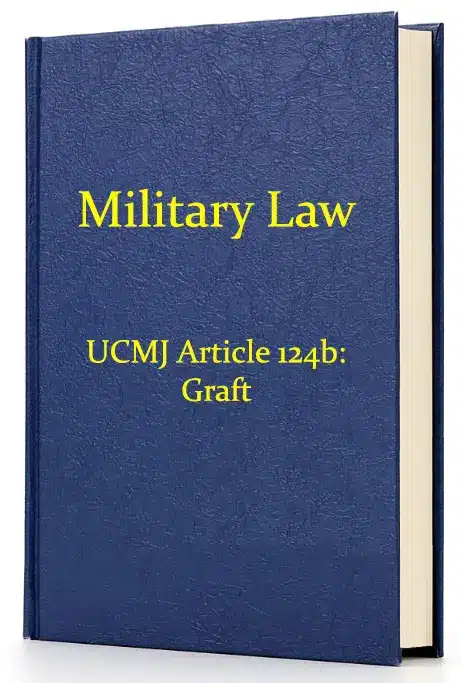The MCM states there are two forms of graft in Article 124b, both of which may subject all service members to prosecution if they are found to violate the article.
Any service member may be subject to prosecution under Article 124b if they occupy an official position or have official duties and wrongfully ask, accept, or receive a thing of value as compensation for or in recognition of services rendered or to be caused by the person concerning an official matter in which the United States is interested.
Service members are also subject to prosecution if they wrongfully promise, offer, or give a thing of value to another person who occupies an official position or who has official duties as compensation for or in recognition of services rendered or to be caused by the other person concerning an official matter in which the United States is interested.
To be prosecuted for asking, accepting, or receiving a graft, it must be demonstrated that:
-
the accused wrongfully asked, accepted, or received a thing of value from a particular person or organization;
-
the accused then occupied a specific official position or had specific official duties;
-
the accused asked, accepted, or received this thing of value as compensation for or in recognition of services rendered, to be induced, or both, by the accused about a particular matter; and
-
this was an official matter in which the United States was interested.
A conviction of promising, offering, or giving a graft requires the prosecution to prove that:
-
the accused wrongfully promised, offered, or gave a thing of value to a specific person;
-
this person then occupied a specific official position or had specific official duties;
-
this thing of value was promised, offered, or given as compensation for or in recognition of services rendered, to be generated, or both, by this person about a particular matter and
-
this was an official matter in which the United States was interested.
Understanding Article 124b (Graft) of the UCMJ
Graft does not require an intent to influence or be influenced in an official matter. Graft involves compensation for services performed in an official matter when no compensation is due.
Maximum Possible Punishment for Violations of Article 124b
Service members convicted of violations of Article 124b face the maximum possible punishment of a dishonorable discharge, forfeiture of all pay and allowances, and three years’ confinement.
How do you defend against Article 124b Graft charges?
When facing the combined military resources and the current cultural climate, you must be prepared to defend your career and freedom. Crisp and Associates, LLC has a team of experienced trial attorneys with over 75 years of combined experience who have won these cases. This team includes the firm’s founder, Jonathan Crisp, a highly respected and sought-after attorney, speaker, and lecturer who has served in the U.S. Army Judge Advocate General’s Corps (JAG) since 1998 and entered private practice in 2007.
If you, or someone you know, is facing Article 124b charges for Graft, you need to speak with a Military defense attorney immediately. We understand what is at risk and learn how to protect your career, freedom, and future.




